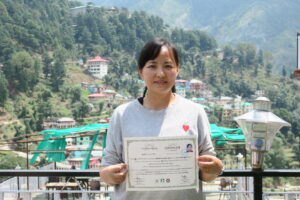Tsekyi was very lonely when she first came to McLeod Ganj, aged 27. She tells me that for a long time she would cry every morning after waking up because she would dream of her parents. “Sometimes,” she says, “I would feel a little regret and wonder why I came [here]”.In 2003, Tseyki, along with a friend and 2 strangers, embarked on an 18-day journey across the Himalayas in order to reach India, meet His Holiness, and learn English. She told only her mother of her plans, who initially approved but then begged her to stay as the departure date loomed.
She was born in Chamdo, Tibet and moved to Lhasa when she was two years old. She went through school there before finding a job as a typist at the Chinese Tourism Office. She found the job boring, but knew she was lucky to have a job close to her family with her limited education. Then she came to India where she initially stayed at the refugee reception centre in Mcleod Ganj and from there she went to school for three years. When I ask Tsekyi how those first months and years were, the expression on her face changes as she tells me of this lonely time. But then, slowly, she says, she began to form connections that grounded her. She got to know her classmates, and her teachers would invite them to their homes and make special moms for them. After graduating from school, she went to live in Mcleod Ganj alone, taking English classes at Lha in 2006.
At Lha, Tseyki met her husband. She smiles as she tells me how at first, they were strictly classmates: he would help her with her English. But then, one day, he called her and asked her on a date, and they eventually got married. Her husband is her only family here, but he traveled to America five years ago in hopes of finding better work and has not been back to India since. This year, she tells me excitedly, he got a green card and she hopes he will be allowed to travel back to India. Tsekyi is trying to join her husband in America but has been having trouble with immigration papers. Her family, who she still talks to regularly, hopes that she will visit Tibet eventually but know she is planning to go to America.
Tseyki confesses, “it was very, very hard for me. When my husband first arrived in America, it was very hard to find a job.” Eventually she found work in the Choesum restaurant, where worked until enrolling in Lha’s Tibetan Traditional Massage and Basic Spa course in June. She wanted to learn a new skill and hoped that the massage course could help her find a good job.
Tsekyi successfully completed the classroom portion of the Tibetan Traditional Massage and Basic Spa course through Lha’s Livelihood Programme. Tibetan massage is unique for its focus on acupressure points to restore balance to and unblock bodily energies. Massage is used as a part of traditional medicine in Tibetan communities to cure both physical and psychological ailments.She and nine other students immersed themselves in the study of traditional Tibetan massage, learning some Thai and Swedish methods along the way. The students will take the skills they learned apply them through an internship with a local, Tibetan-owned spa.
Learning Tibetan massage techniques was challenging, Tsekyi says, but her teacher, taught them gently and kindly. Tsekyi remembers that before she began the course, she wasn’t strong enough to apply enough pressure to the person she massaging. “I felt very disappointed,” she recalls. “But the teacher always said, ‘Don’t think about this. You can practice day by day and get better.’” And now, Tsekyi tells me that she feels comfortable in her massaging abilities, and she has grown to really enjoy it. Before her course, she thought it was very hard work to be a masseuse – and she was right – but she also came to view the job as a very good one. She explains that massages can help heal sick patients. “I think it’s good,” she says, “by yourself, you can help other people [through massage]”.
When I ask her if she’s excited to begin her internship, she laughs and says, “Yes, very excited!” After a few seconds she adds, “a little nervous also.” Tsekyi hopes to learn other spa trades in her internship, such as facials, hair, and make-up.
I ask her if she will continue with massage when she eventually goes to America to join her husband, to which she answers, “I hope, because right now I am very interested in the massage. So I hope I can find a job there. I want to find a job at a massage centere.” I tell Tsekyi that Americans love massages, and she smiles a big smile at me.





 Print
Print Email
Email













